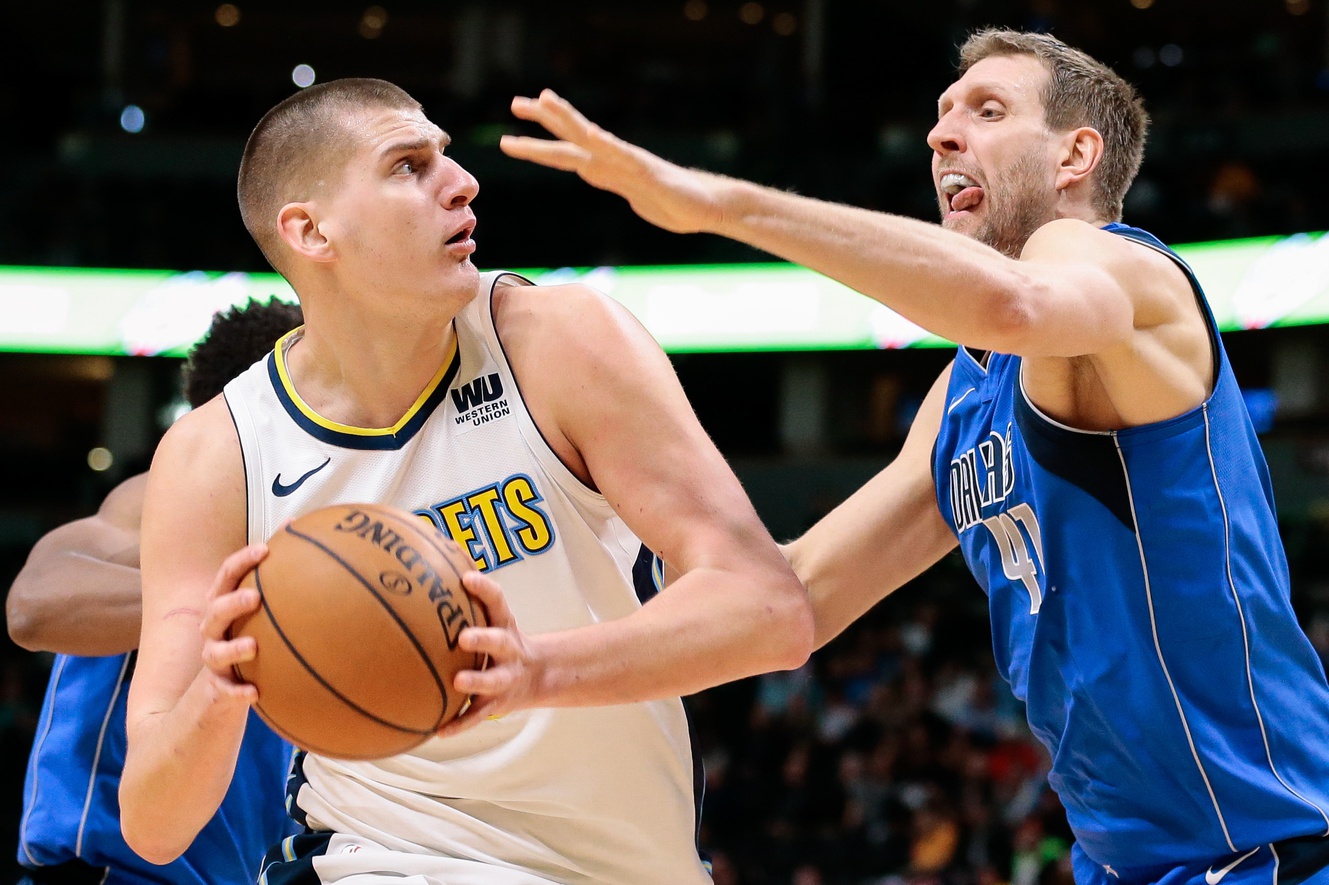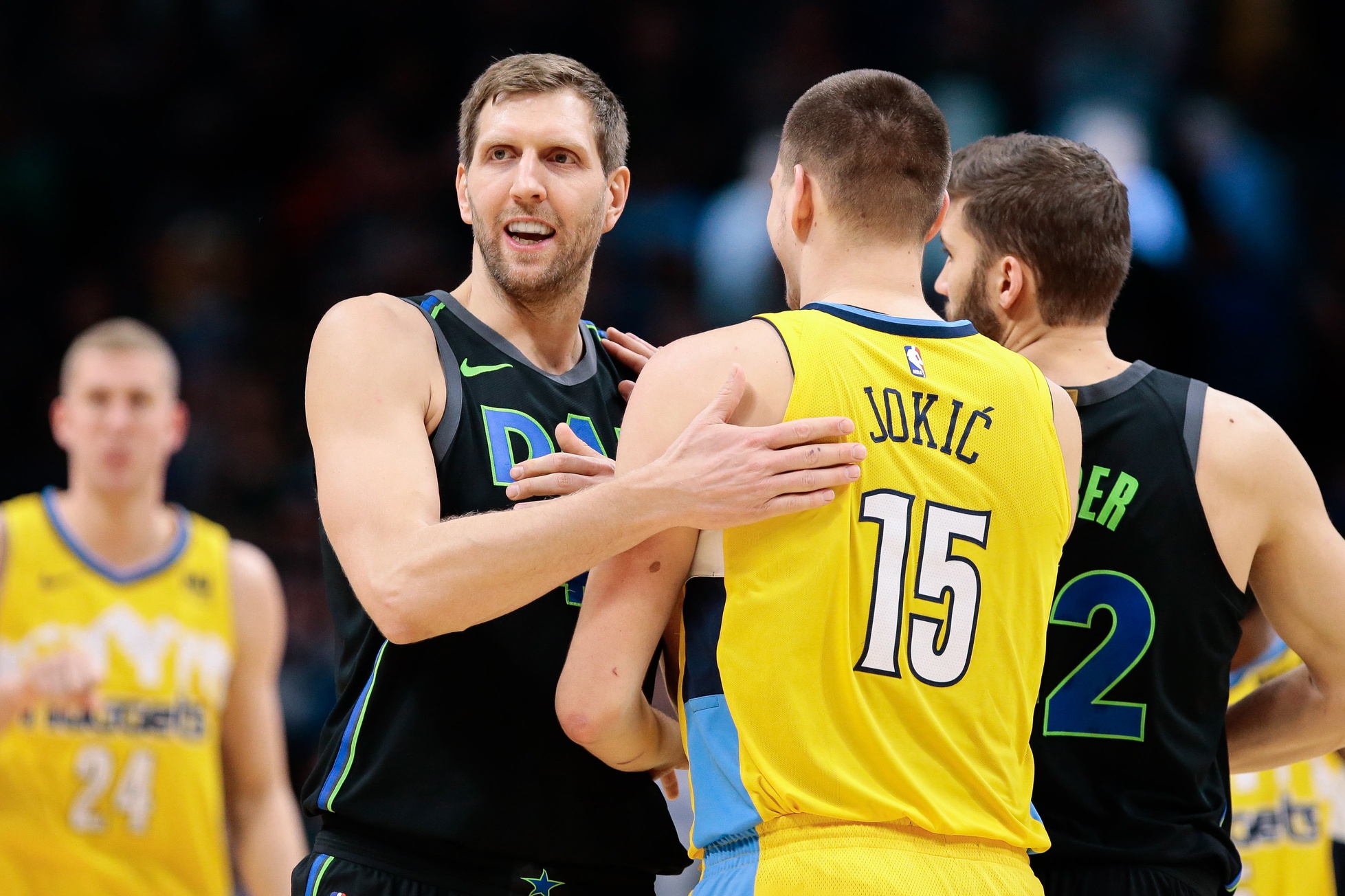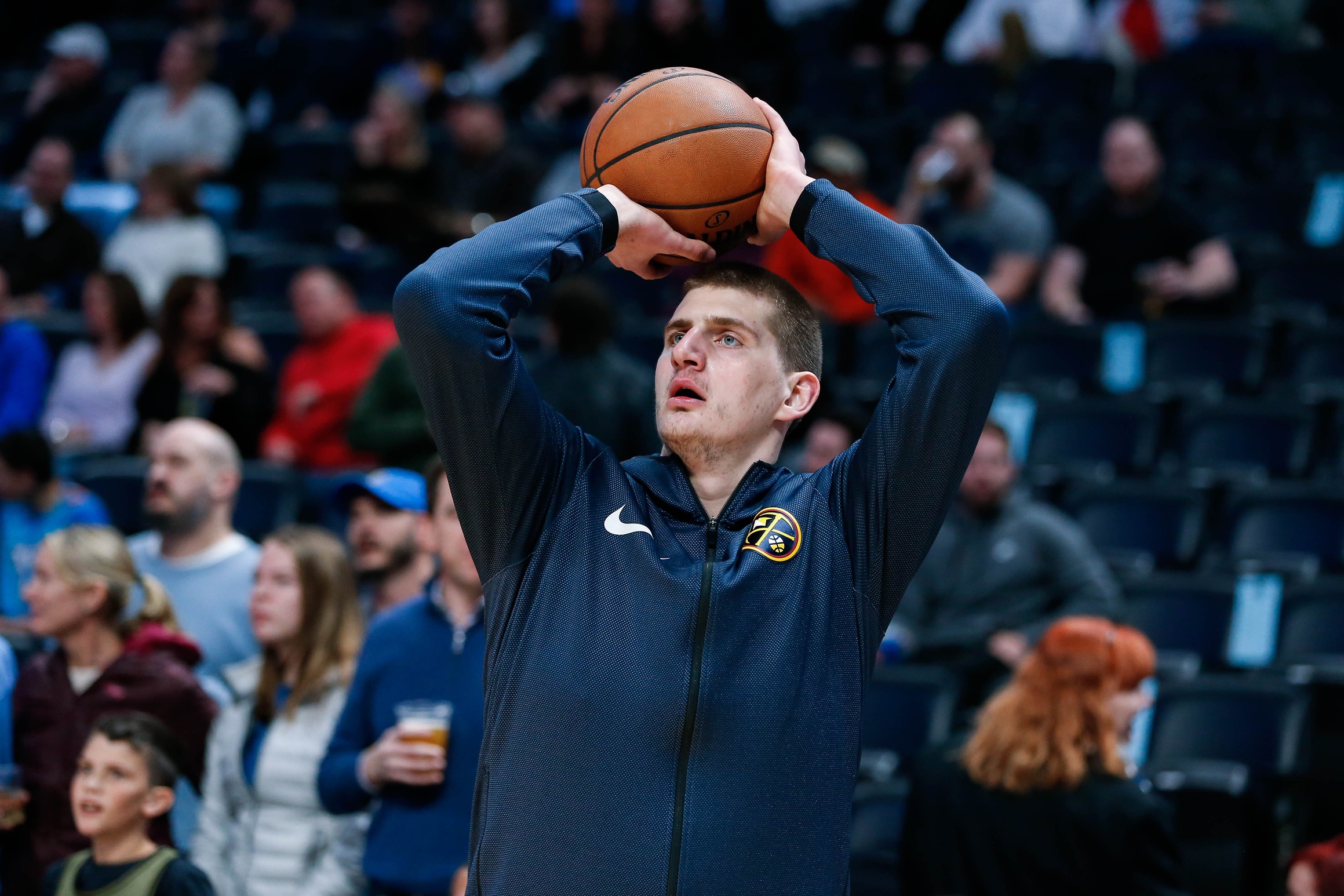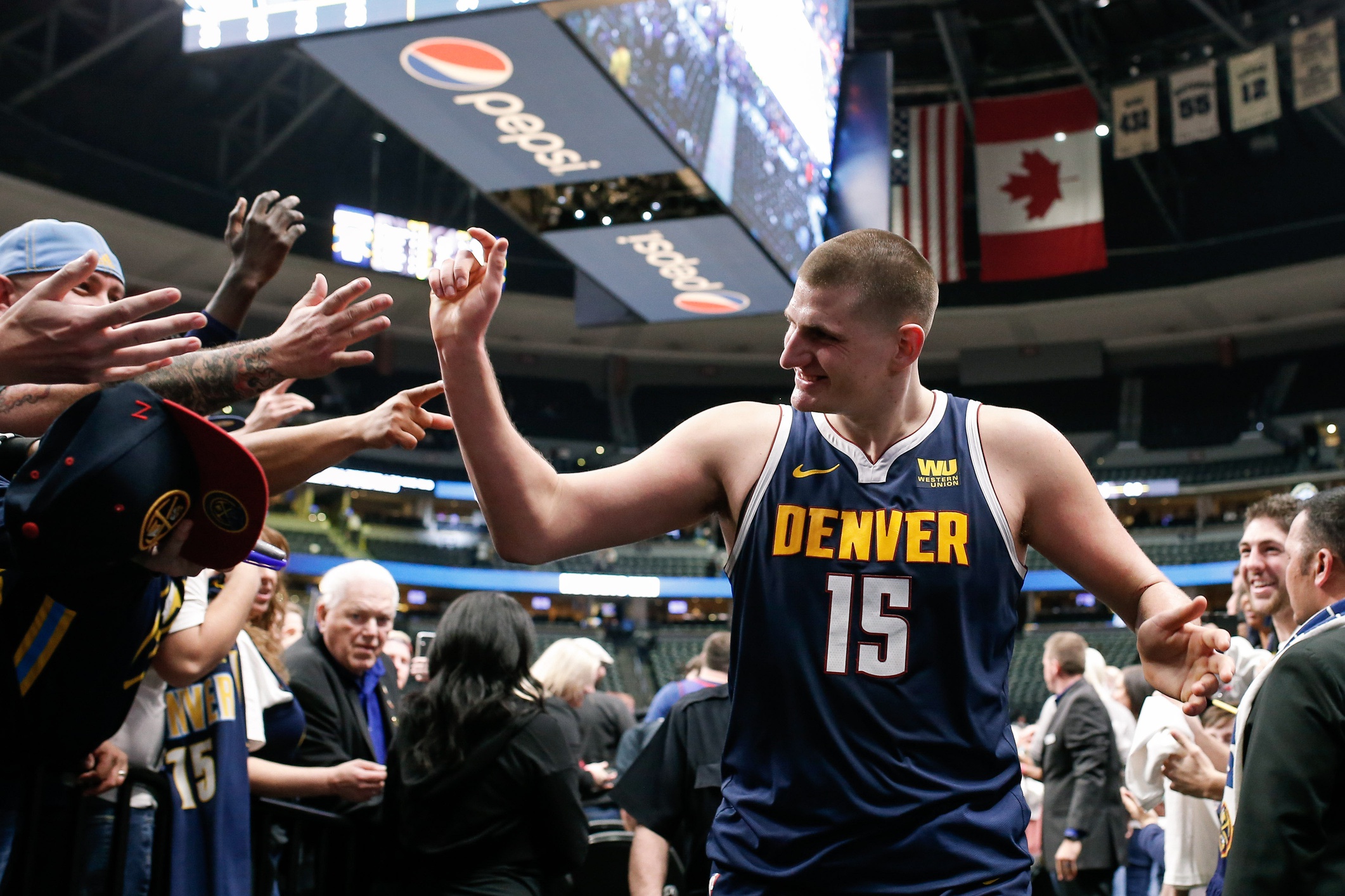© 2024 ALLCITY Network Inc.
All rights reserved.

The fadeaway Nikola Jokic began toying around with while he was on the mend from a sprained ankle last winter looked like the shot Dirk Nowitzki made famous except for one crucial difference. When Nowitzki went to his signature shot, he jumped off his left foot and raised his right leg into the air as if a string connected it to his elbow. Jokic jumped off his right foot and thrust his left leg into the air instead, a more awkward spin on the fallaway Nowitzki used again and again on his way to more than 30,000 career points.
“My whole body is wrong, so…” Jokic joked, trying to make sense of his wrong-footed fallaway.
High release points and soft touches are not the only things Jokic and Nowitzki have in common. Jokic is a playmaker first and Nowitzki a scorer, but in many ways the 23-year-old Serbian is traveling the same roads the 40-year-old German did a decade and a half ago. Both are unselfish European stars who’ve found NBA success in untraditional ways. The idea that an offense could revolve around a jump-shooting 7-footer was unheard of until Nowitzki showed up. Similarly, there was not much precedent for an offense flowing through a center with Jokic’s passing ability until Denver made him its focal point in December 2016.
The Nuggets have piled up points like those Mavericks teams of the early-2000s since rearranging things around Jokic. His emergence has given a franchise that was rudderless in the post-George Karl era an identity. The Nuggets play the beautiful game. This year they’re even playing defense too. At 21-9, they’re first in the Western Conference despite a rash of injuries. Their success has shifted more and more attention onto their best player, which Jokic sometimes seems uncomfortable with — not unlike Nowitzki used to be.

Nowitzki accomplished a lot over the first six seasons of his career. He earned three-straight All-Star appearances from 2001-04 and had already been named to the All-NBA Third Team twice and the All-NBA Second Team twice. In 2003, he was the leading scorer on a Mavericks team that made a run to the Western Conference Finals. Despite that individual and team success, Nowitzki still didn’t view himself as the face of the franchise in Dallas.
“I was busting his chops about something. I said, ‘This is your team. You’re the face of the franchise now. You’ve got to go do that,'” said Nick Creme, Nowitzki’s longtime friend. “I never had the stones to give the guy advice. But it was more like a jab. I remember he said, ‘No, this is Fin’s team.'”
Creme started out as a basketball operations intern with the Mavericks in 2001. He ran errands mostly, taking players to the airport and filling up their cars. He became close with two of the younger international players on the roster during that time: Nowitzki and Steve Nash. Their friend group liked to watch games, see movies and go out to eat on off nights. Sometimes they had to convince Nowitzki to leave the couch.
“We’d be in the living room about to go to dinner and he’d pull the plug because he didn’t feel like going out that night,” Creme said. “He didn’t want that spotlight. The shy guy in him would rather just hole up with his buddies and get pizza and beer and watch the game.”
Nowitzki considered small forward Michael Finley ahead of him on the totem pole even though it was clear by that point that Nowitzki was the team’s best player. Finley endured some awful seasons in Dallas before Nowitzki showed up, including a 20-win campaign in 1997-98. Together they turned the Mavericks from a laughing stock into one of the league’s most successful teams.
The Mavericks won 50-plus game four seasons in a row, but in August 2005 they waived Finley using a one-time amnesty provision to save millions in luxury tax. Nash had already left for Phoenix the summer before. Suddenly, there was no one else for the spotlight to fixate on besides Nowitzki.
“Out of the Big Three, I was sort of the last man standing,” Nowitzki said. “I kind of grew into that role. I started embracing it and enjoying it.”
The Mavericks won 58 regular-season games in Nowitzki’s first season as the undisputed face of the franchise. In 2006 Nowitzki dragged a Mavericks team that’s second- and third-leading scorers were Jason Terry and Josh Howard to the Finals. The Mavericks blew a 2-0 lead to the Heat, but they got revenge five years later by knocking off Dwyane Wade and LeBron James in one of the biggest upsets in Finals history.
Any lingering doubts about Nowitzki’s leadership were erased forever after that. The player who became the face of the franchise by default after Nash left and Finley was waived had carried his team to the sport’s highest pinnacle.

The Nuggets were flying high Feb. 15 after drilling 24 3s. That night in Milwaukee, Jokic needed just 14 minutes and 33 seconds to record the fastest triple-double in NBA history. He scored 30 points, grabbed 15 rebounds and distributed 17 assists as Denver won a wild shootout 134-123 . It was one of four triple-doubles Jokic recorded that month. He was playing some of the best basketball career. There was no indication that in three weeks, he’d fade into the background.
On Feb. 27, Paul Millsap returned from a wrist injury that cost him 44 games on national TV against the Los Angles Clippers. Almost immediately, Jokic went from conductor to passenger. He took five shots as the Nuggets blew a 19-point second-half lead. Jokic was deferring with Millsap, a three-time All-Star, back in the picture. Everything came to a head three games later in Dallas. Jokic scored four points on 2-for-9 shooting before being benched in the fourth quarter of a loss to the tanking Mavericks.
Everyone seemed to understand Denver’s offense needed to flow through Jokic for them to be successful besides the fulcrum himself. After that game, Nuggets coach Michael Malone sat Jokic down and delivered a point-blank message.
“‘You are our franchise player. You are our go-to player. I need you to be aggressive,'” Malone told him. “He took that to heart.”
Millsap echoed Malone’s message: Jokic shouldn’t be bashful about taking over.
“He’s such a humble guy that sometimes he looks for me to do things, and it’s him. He’s our team,” Millsap said. “He makes a lot of things go for us, so he’s got to continue to stay aggressive. I’m here to help him and back him in any way possible.”
Jokic went for 36 points Denver’s next time out. He carried the Nuggets down the stretch, averaging 24 points on 53.8 percent shooting, 11.5 rebounds and 6.4 assists their final 18 games. Jokic was the best player on the floor in Denver’s do-or-die game against the Minnesota Timberwolves on the final night of the regular season. Denver lost a heartbreaker in overtime, but it became clear over the final month of the season that Jokic was worth building around. The Nuggets signed him to a five-year deal worth $148 million in July, tethering themselves to a star who was only beginning to understand how good he could be.

The crowds have gotten bigger and the lights a little brighter. The Nuggets were dead last in home attendance in 2016-17, drawing an average of 14,770 fans per game. This year they’ve climbed to 16th. Nearly 18,000 people pack Pepsi Center to watch the best show in town. The TV cameras have followed.
“Bright,” said Jokic, using his right hand to shield a light pointing at him as the media closed in following shootaround Wednesday.
If Jokic is still learning to deal with the attention, it hasn’t affected his play on the court. The Nuggets are cruising despite injuries to three starters (Paul Millsap, Will Barton and Gary Harris), their projected sixth man (Isaiah Thomas) and 2018 first-round pick (Michael Porter Jr.).
“He is a Most Valuable Player candidate,” Malone said after Jokic roasted the Mavericks for 36 points and 16 rebounds.
Before Jokic returned to his home in Sombor, Serbia, this summer, Malone asked him to work on defense. Staying in front of smaller, quicker players in space has been Jokic’s biggest Achilles’ heel in the early part of his career. In March, Thomas, then with the Lakers, crossed over Jokic so hard he had time to twist his head around and laugh as he drove in for an uncontested layup.
Jokic trains with his godfather, Nebojsa Vagic, during the offseason. An assistant coach with the Russian club BC Avtodor Saratov, Vagic has known Jokic since he was a boy. This summer Vagic devised a regimen that focused on leg training and lateral quickness. Their work is paying off. Jokic is no longer a liability defending the pick and roll. The Nuggets are fourth in defensive rating after three consecutive seasons in the bottom 10.
“He likes to do his job,” Vagic said. “But he doesn’t like all the lights in the theatre to be pointing on him at all times. He doesn’t run away from responsibilities or even saying he’s a leader. But he doesn’t want to be too transparent.”
Nowitzki was never considered a vocal leader. One of the ways he earned his teammates’ respect was by outworking them. Nowitzki’s work ethic is legendary. When Avery Johnson became the Mavericks head coach in 2005, he instituted a rule that fined players for coming into the practice facility on off days.
“That rule was basically implemented for Dirk,” said Nuggets assistant general manager Calvin Booth, who played two separate stints with the Mavericks. “He got fined for coming to the gym.”
Writer Ian Thomsen watched one of Nowitzki’s summer workouts while on assignment for Sports Illustrated. Nowitzki picked Thomsen up and drove him to a gym an hour outside of Wurzburg, Germany, his hometown. Nowitzki had been up all night with a toothache. He had a dentist appointment scheduled for that day — but not until he finished working out with his trainer, Holger Geschwindner.
They went through a grueling series of exercises designed to improve Nowitzki’s balance. Nowitzki did deep squats, grabbed the ball off the floor, turned and shot in one motion. He walked up and down the court on his hands. He wore a 20-pound weight vest for most of the workout.
“I just remember when he took it off, he threw it like it was a shot put,” said Thomsen, who authored “The Soul of Basketball: The Epic Showdown Between LeBron, Kobe, Doc and Dirk That Saved the NBA.” “There was this big groan like, ‘Thank God I’ve got this off me.’ The whole time I was just thinking, ‘This guy is already an All-Star. This guy is already an NBA player. He’s already got all this money.”
Thomsen was in Miami the night the Mavericks won the championship. He thought back to the workout outside of Wurzburg as Nowitzki hoisted the Larry O’Brien trophy on stage.
“It was all because of work,” Thomsen said. “The work convinced him he could become a star.”

As Nowitzki’s career is winding down, Jokic’s is just beginning. Nowitzki is in his 21st with the Mavericks. He’s spent more years with one franchise than anyone in NBA history. He’s seventh on the NBA’s all-time scoring list. He’s won a regular-season MVP and a Finals MVP. Jokic hasn’t won anything of significance yet. Though it’s far from his fault, the Nuggets finished one game out of the playoffs the last two seasons. They appear poised to finally break through in 2019 and could even make some noise once they get there.
A contract worth enough to make Jokic’s grandkids rich hasn’t changed him. He still wears the same Nike sweatsuits after games. He’s still allergic to praise.
“I shot a lot. Thirteen of 25. That’s all right I think” Jokic said Wednesday. “I need to get to the line a little bit more. I need to be more aggressive. I don’t know how. But somehow I need to be more aggressive.”
In four years, Jokic has gone from unknown second-round pick to best player on the NBA’s most promising young team. The Nuggets are primed to be a playoff fixture in the years to come. Jamal Murray is 21. Malik Beasley is 22. Monte Morris, Juancho Hernangomez and Jokic are 23. Gary Harris is 24. They are loaded with talent. All of it fits together likes puzzle pieces around Jokic.
“I think Nikola is one of the brightest minds in basketball period,” Booth said. “I think there’s an artistic element to his game. I think with an artist you kind of have to step back and let them do things, paint the canvas the way they want to paint it. I think it’s for him to decide when to be aggressive, when to pass more. He’s a young guy who’s figuring that out, but I trust his judgement.”
Jokic might not ever deliver a “win one for the Gipper” style speech, but he can lead in other ways. He recognized Denver needed him to shoulder more of the scoring load these last five games without Barton, Millsap and Harris. He’s averaging 26.6 points on 54.9 percent shooting since Dec. 8.
“It’s working, and every year there’s a little improvement,” Nuggets general manager Arturas Karnisovas said. “He gets a little more experience. He sees what’s working and what’s not working. He’s unique in that way. The style of his leadership has been working, and he’s still 23. Every year you mature and you improve and learn and you get close with your teammates and you know to talk to them. I think it’s a learning process for him.”
Nowitzki got there gradually. The Nuggets are optimistic Jokic can do the same. It took Nowitzki years to become comfortable as face of the franchise. It was not in his nature. He hardened into what he became.
“But it comes with a responsibility,” Nowitzki said. “It comes with a responsibility off the floor in the community, and it comes with a responsibility on the court. Every night the other team is game planning for you. You’ve got to be there for your team. There will always be tough shooting nights, but you’ve got to play your all-around game as a franchise player and leader and help your team somehow win the game. With being a face of a franchise comes a responsibility, but you’ve just got to embrace it and grow into that role and enjoy it.”
Comments
Share your thoughts
Join the conversation



